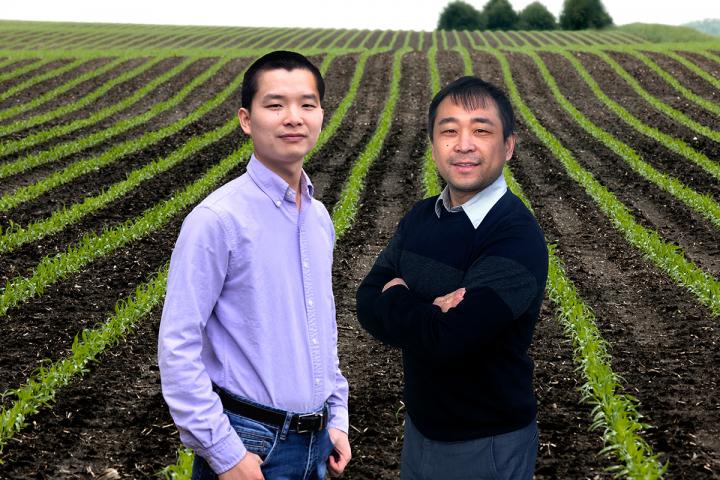
Credit: Photo illustration by Fred Zwicky
CHAMPAIGN, Ill. — Crop modeling is essential for understanding how to secure the food supply as the planet adapts to climate change. Many current crop models focus on simulating crop growth and yield at the field scale, but lack genetic and physiological data, which may hamper accurate production and environmental impact assessment at larger scales.
In a new paper published in the journal Nature Plants, researchers identify a series of multiscale and multidisciplinary components – from crop genetics up to global factors – that are critical for finding environmentally sustainable solutions to food security.
Many crop models focus on understanding how plant characteristics such as leaf size play into the crop yield at the field scale, the researchers said. “Modeling at this scale is critical, but we would like to incorporate information from gene-to-cell and regional-to-global scale data into our modeling framework,” said Bin Peng, a University of Illinois at Urbana-Champaign postdoctoral researcher and co-lead author.
The study identifies components that could help generate a more informative modeling framework. “Multiscale modeling is the key to linking the design of climate change adaptation strategies for crop and field management with a large-scale assessment of adaptation impact on crop production, environment, climate and economy,” Peng said.
The study calls for a better representation of the physiological responses of crops to climate and environmental stressors – like drought, extreme rainfall and ozone damage. “Many physiological processes would be important to simulate the crop growth under stressed conditions accurately,” Peng said. Examples include water moving from soil to plant to atmosphere driven by canopy energy balance, he said.
“We should also include a better representation of crop management,” Peng said. “That would be extremely important for assessing both crop production and environmental sustainability, as well as their tradeoffs.”
The researchers said there are opportunities to close a variety of data gaps, as well. “Integration of remote-sensing data, such as the work performed in our lab, will be extremely valuable for reducing data gaps and uncertainties,” said natural resources and environmental sciences professor and project investigator Kaiyu Guan. “One of the advantages of remote sensing is its vast spatial coverage – we can use remote sensing to constrain crop models over every field on the planet.”
The authors also propose a model-data integration pathway forward. “Doing the right simulation of crop responses to climate change factors is critically important,” Guan said. “The most challenging part is whether crop models can capture those emergent relationships, which can be derived from empirical observations.”
“No single scientist or research lab can produce these models on their own,” said study co-author and plant biology professor Amy Marshall-Colón. “This type of effort will require patience and collaboration across many disciplines.”
###
Peng, Guan and Marshall-Colón also are affiliated with the National Center for Supercomputing Applications at the U. of I. Marshall-Colón also is affiliated with the Carl R. Woese Institute for Genomic Biology.
The National Science Foundation, NASA, the U.S. Department of Agriculture, the Foundation for Food and Agriculture Research and the National Center for Atmospheric Research supported this study.
Also contributing to this study were researchers from the U. of I.; the Lawrence Berkeley National Laboratory; the University of Florida; the University of Queensland; the University of Chicago; the University of Bonn; the Centre for Agricultural Landscape Research; the University of Alberta; the University of Minnesota, Twin Cities; the Center for Atmospheric Research; Beijing Normal University; Corteva AgriScience; the University of Nebraska, Lincoln; and Wageningen University and Research.
Editor’s notes:
To reach Bin Peng, call 217-974-5389; email [email protected].
To reach Kaiyu Guan, call 217-300-2690; [email protected].
The paper “Towards a multiscale crop modelling framework for climate change adaptation assessment” is available online and from the U. of I. News Bureau. DOI: 10.1038/s41477-020-0625-3
Media Contact
Lois Yoksoulian
[email protected]
Original Source
https:/
Related Journal Article
http://dx.




